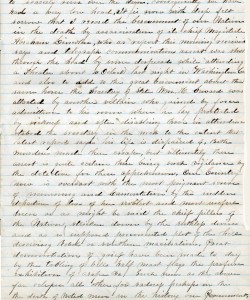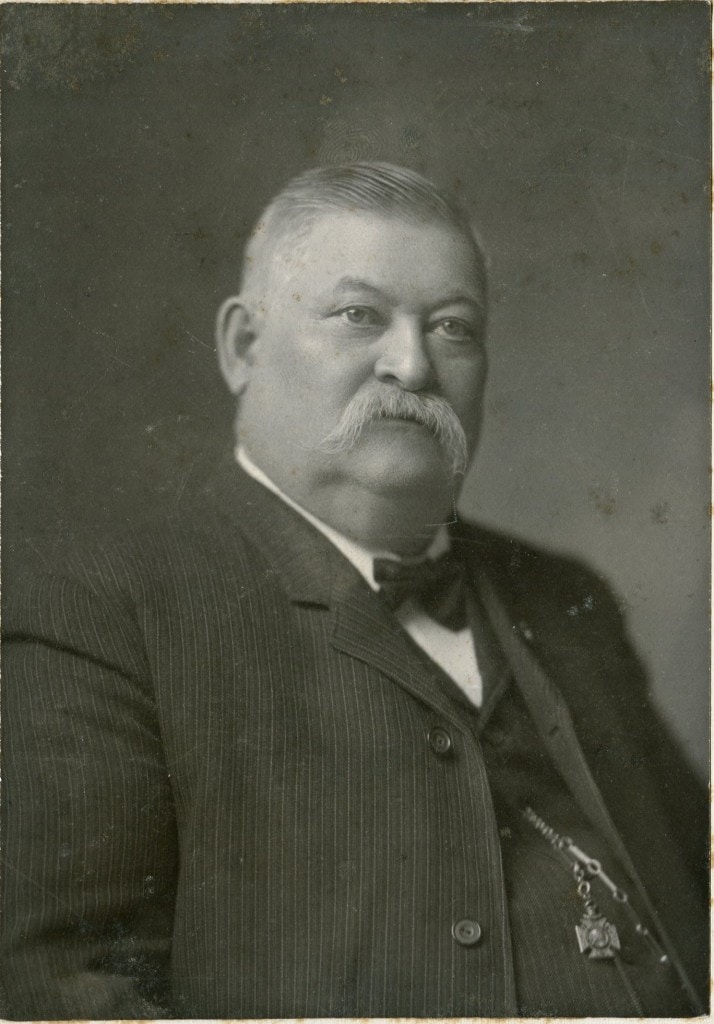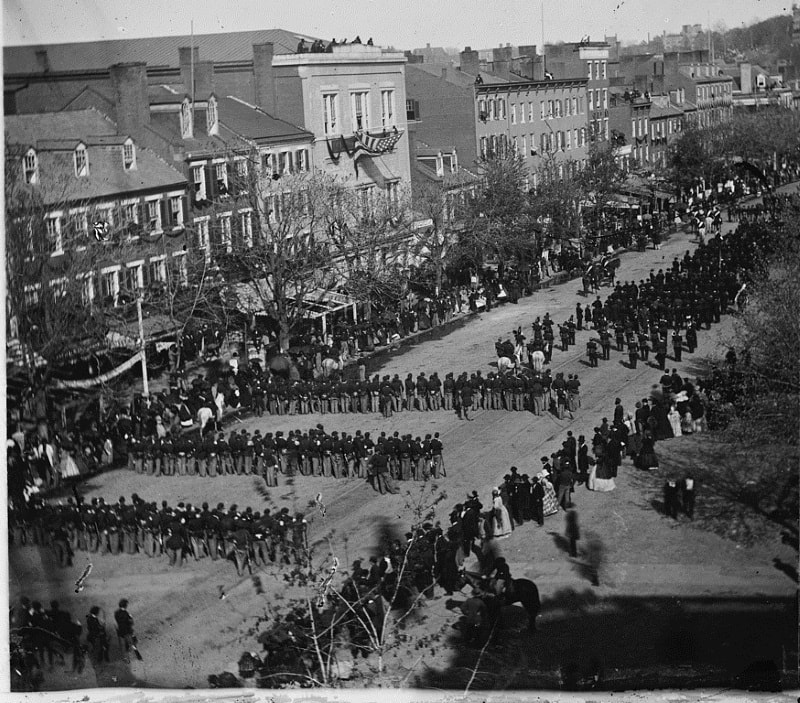Lincoln’s Assassination as Seen in Geneva
By Anne Dealy, Director of Education and Public Information
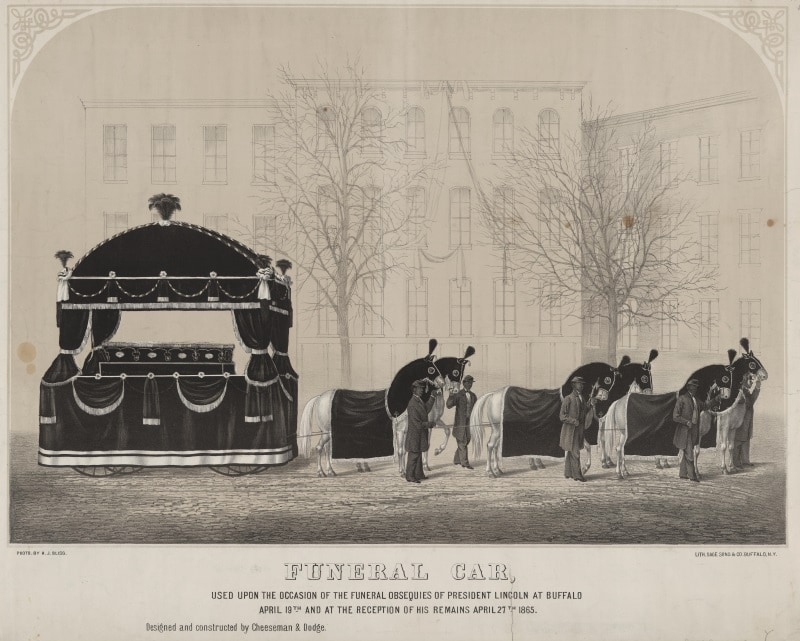
The carriage used during the reception of Abraham Lincoln’s remains in Buffalo. Image courtesy Library of Congress.
One hundred fifty years ago this week actor John Wilkes Booth changed American history when he stepped into the Lincolns’ booth at Ford’s Theater and shot the president in the back of the head, the first man to assassinate a U.S. president. The assassination was an awful event that shook the nation just a week after Lee’s surrender overjoyed the North. This swing from joy to sorrow was chronicled across the nation and is nicely captured in a recent New York Times opinion piece. While many artifacts, accounts and stories of the assassination exist, the perspective of the people living in Geneva at the time is harder to come by. Not much remains to tell us what they thought. The only contemporary written individual reaction we have to the news is from Henry Youngs, a grist miller in Seneca Castle. On Saturday, April 15, 1865 he interrupted his daily account of corn grinding with the news that the president was dead:
It is now with deep felt sorrow that I record the bereavement of our Nation in the death by assassination of its chief Magistrate Abraham Lincoln, who as report this morning received says and telegraph communication assert was shot through the head by some desperado while attending a theater about 11 o’clock last night in Washington City, and also to add to the great bereavement about the same hour the Secretary of State Wm. H. Seward was attacted [sic] by another villain who gained by forced admittance to his room where he lay prostrated by sickness and after disabling those in attendance stabed [sic] the secretary in the neck to the extent that latest reports say his life is dispaired [sic] of. Both murderers made their escape, but ultimately their arrest is quite certain there being such vigilance by the detectives for their apprehension. Our Country now is overcast with the most poignant sense of mourning and lamentation by the sudden departure of two of her noblest and most useful men or as might be said the chief pillars of the Nation, stricken down by the ruthless devises and as supposed preconcerted plot of the hell deserving Rebels or southern macinations [sic]. Great demonstrations of grief have been made today by the tolling of bells, half-mast flags, the profuse exhibition of crape etc. Such news as the above far eclipses all other for sadness perhaps in the death of noted men in the history [of] our Government.
If most Genevans were much like Youngs and others who recorded their thoughts about the death of the president, they were as numb with sorrow as many of us were on September 11, 2001.
Not everyone agreed with the war or supported Lincoln’s policies. New York had a strong Democratic party and was one of several states divided over the war, particularly over the draft and the issue of slavery. Much of this can be read in the extant newspaper of the time, the Geneva Gazette. Newspapers in the 19th-century were affiliated with political parties and explicitly partisan in their reporting. Unfortunately very few issues of Geneva’s Republican newspaper, The Geneva Courier, still exist, but there is a largely complete collection of the Democratic Geneva Gazette. Today they are available online through the NYS Historic Newspaper project.
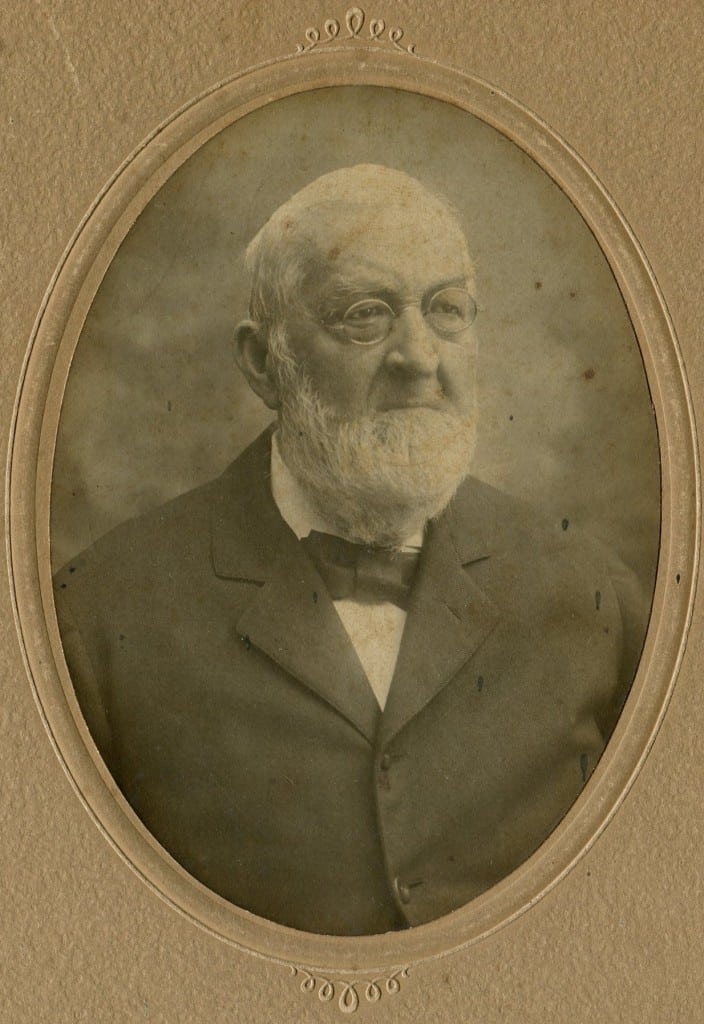
Brothers Stephen and Edgar Parker owned and edited the Geneva Gazette, Geneva’s Democratic newspaper.
The Gazette was run and edited by brothers Stephen and Edgar Parker, who were loyal to the Union, but no friends to Lincoln, emancipation, or civil rights for the enslaved. Before the election of 1864 they wrote:
If Mr. Lincoln is reelected, before the 4th of March 1869 our country will be in a state of financial bankruptcy, the national debt will be repudiated, the sections will be struggling with each other, or with the central government, against the assaults of arbitrary power; and from these seething elements under a second Caesar or Cromwell or Napoleon, there will emerge a colossal military despotism, which will crush out and obliterate every vestige of freedom on this Continent; or else as is more probable, the North and the South will be divided into feeble and separate Republics, exhausted and humiliated before the world and suffering the extreme of national demoralization.
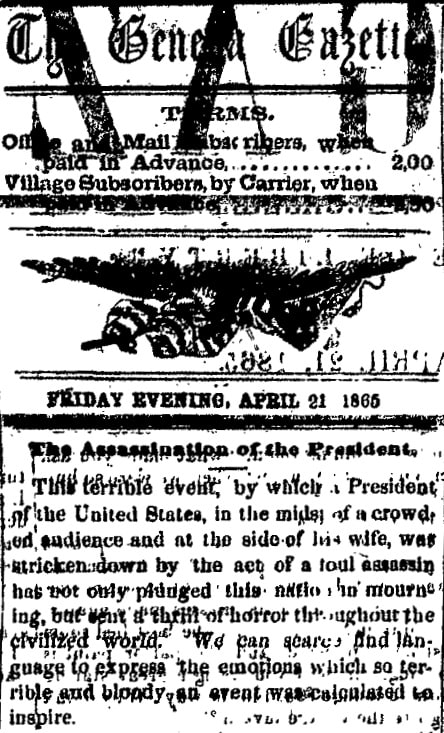
The lead article in the Geneva Gazette for April 21, 1865 was on the assassination of President Lincoln.
Yet, except for those few who secretly rejoiced at the assassination, the entire North was shocked and horrified at the murder of the president in April 1865. A weekly paper published on Fridays, the Gazette did not write about the news until Friday, April 21. In keeping with the practice of the time, it was not on the front page—this was used for advertisements, poems, short stories and occasionally the text of recent speeches on politics or religious matters. It is page two where you find a detailed description of the attack on Lincoln and Seward, complete with eyewitness accounts. [Read the original] This was followed by an editorial column which proclaimed, “Whatever may have been our own views…as to the policy of conducting the war adopted by the late President, one thing seems generally conceded, that his more recent acts—.…—all indicated a temper and disposition, on the part of Mr. Lincoln well calculated to close the bleeding wounds of the nation, and restore again that Union which no true American citizen has ever ceased to venerate and to love.” Much of the remainder of the column is devoted to a plea to readers not to blame the Southern people for the actions of an isolated few.
On page three, the editors recorded their own tribute to Lincoln and printed the resolutions that were passed by the village on the day of Lincoln’s death. You can read a transcription here or see the original.
The week of April 28 the Gazette had an account of the funeral at Washington, a detailed description of the coffin and the embalming process, and the story of the killing of John Wilkes Booth and capture of his accomplice David Herold. It was also reported that Lincoln’s funeral train stopped briefly in Syracuse on its way to Springfield, Illinois.
Perhaps other reactions are buried in our collection of scrapbooks and letters, but for now this is all we know of Geneva’s reaction to the first assassination of a president.

